Schedule
Download the schedule of SmartComp 2022 as a PDF file
Download the detailed program of SmartComp 2022 (main track) as a PDF file
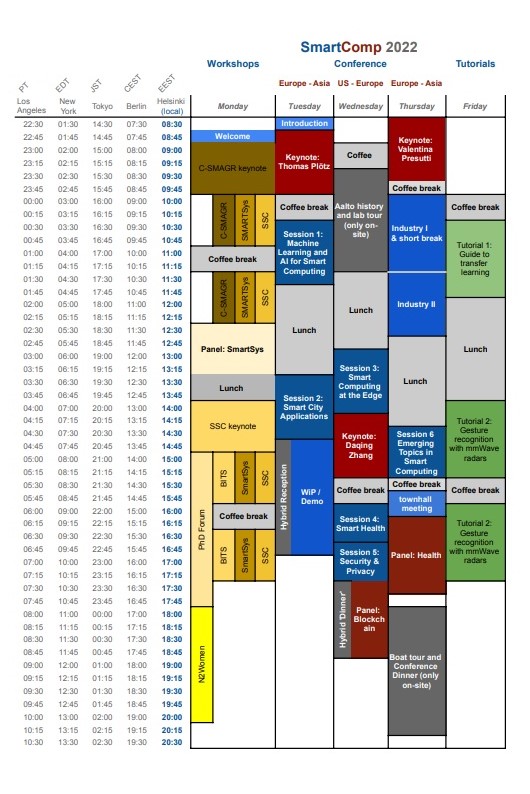
Monday, June 20 08:45 (Europe/Helsinki)
6th International Workshop on Big Data and IoT Security in Smart Computing (BITS 2022)
https://www.yama.info.waseda.ac.jp/bits2022/
8th IEEE International Workshop on Sensors and Smart Cities (SSC 2022)
http://ssc2022.unime.it
7th Workshop on Smart Service Systems (SmartSys 2022)
http://smartsys2022.dii.unipi.it/
1st Workshop on Climate-Smart Agriculture (C-SmAgr 2022)
http://c-smagr.santannapisa.it/
Monday, June 20 09:00 C-SMAGR Keynote
|
|
Managing risks to build climate-smart and resilient agrifood value chains
Federica Matteoli
Food and Agriculture Organization of the United Nations
|
Click here for more information
Monday, June 20 12:30 SmartSys Panel
AI and Autonomy for Smart Services
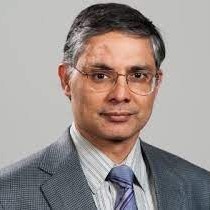 Gurdip Singh
National Science Foundation
Gurdip Singh
National Science Foundation
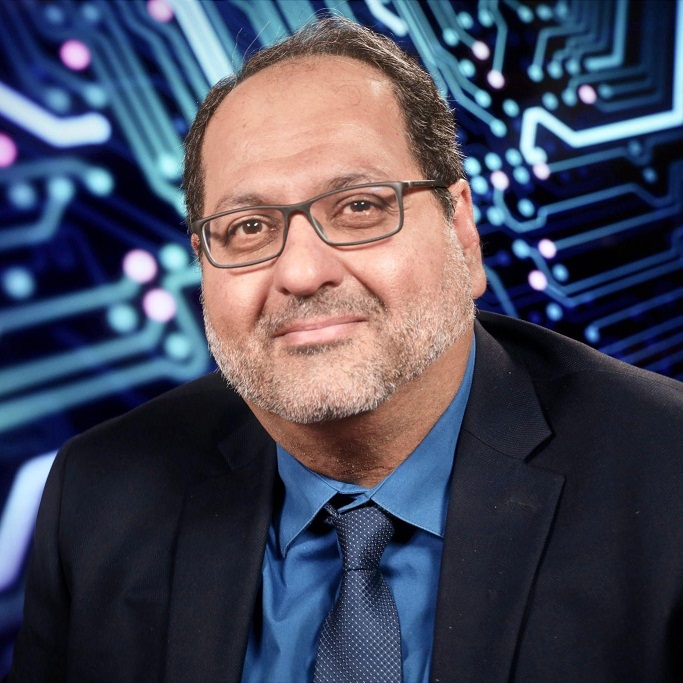 Ness Shroff
Ohio State University
Ness Shroff
Ohio State University
 Yiran Chen
Duke University
Yiran Chen
Duke University
 Franco Zambonelli
University of Modena and Reggio Emilia
Franco Zambonelli
University of Modena and Reggio Emilia
Monday, June 20 14:00 SSC Keynote
|
|
Data, competences, interdisciplinarity and technologies: the right mix for smart cities
Roberto Rossi
Thales Italia S.P.A.
|
Click here for more information
Monday, June 20 15:00 - 17:50 (Europe/Helsinki)
PhD Forum
Click here for more information about the PhD Forum
Monday, June 20 18:30 - 19:50 (Europe/Helsinki) N2Women Keynote
|
|
A Journey in Academia: From Theory to Practice
Eirini Eleni Tsiropoulou
University of New Mexico
|
Click here for more information about the N2Women Event
Tuesday, June 21 08:45 (Europe/Helsinki) Keynote
|
|
Computational Behavior Analysis — Smart Devices, Smart Data Analysis, and Smart Humans are Pushing the Boundaries towards usable Digital Health
Thomas Ploetz
Georgia Institute of Technology
|
Click here for more information
Tuesday, June 21 10:30 - 11:45 (Europe/Helsinki)
S1: Machine Learning for Smart Computing
| 10:30 |
Knowledge Infusion for Context-Aware Sensor-Based Human Activity Recognition (full paper), Luca Arrotta and Gabriele Civitarese (University of Milan, Italy); Claudio Bettini (Università degli Studi di Milano, Italy) |
| 10:50 |
CoDEm: Conditional Domain Embeddings for Scalable Human Activity Recognition (full paper), Abu Zaher Md Faridee, Avijoy Chakma, Zahid Hasan and Nirmalya Roy (University of Maryland Baltimore County, USA); Archan Misra (Singapore Management University, Singapore) |
| 11:10 |
Generalised Zero-shot Learning for Entailment-based Text Classification with External Knowledge (full paper), Yuqi Wang, Wei Wang, Qi Chen and Kaizhu Huang (Xi'an Jiaotong Liverpool University, China); Anh Nguyen (University of Liverpool, United Kingdom (Great Britain)); Suparna De (University of Surrey, United Kingdom (Great Britain)) |
| 11:30 |
AmicroN: Framework for Generating Micro-Activity Annotations for Human Activity Recognition (short paper), Soumyajit Chatterjee and Bivas Mitra (IIT Kharagpur, India); Sandip Chakraborty (Indian Institute of Technology Kharagpur, India) |
Tuesday, June 21 13:30 - 14:45 (Europe/Helsinki)
S2: Smart City Applications
| 13:30 |
* Best paper candidate * CitySpec: An Intelligent Assistant System for Requirement Specification in Smart Cities (full paper), Zirong Chen (Vanderbilt University, USA); Isaac Li (University of Virginia, USA); Haoxiang Zhang (Columbia University, USA); Sarah Preum (Dartmouth College, USA); John Stankovic (University of Virginia, USA); Meiyi Ma (Vanderbilt University, USA) |
| 13:50 |
Smart Edge-Enabled Traffic Light Control: Improving Reward-Communication Trade-off with Federated Reinforcement Learning (full paper), Nathaniel Hudson (University of Kentucky, USA); Pratham Oza (Virginia Tech, USA); Hana Khamfroush (University of Kentucky, USA); Thidapat Chantem (Virginia Tech, USA) |
| 14:10 |
* Best paper candidate * SmartWaterSens: A Crowdsensing-based Approach to Groundwater Contamination Estimation (full paper), Lanyu Shang (University of Illinois at Urbana-Champaign, USA); Yang Zhang (University of Notre Dame, USA); Quanhui Ye, Na Wei and Dong Wang (University of Illinois at Urbana-Champaign, USA) |
| 14:30 |
Neural Architecture and Feature Search for Predicting the Ridership of Public Transportation Routes (short paper), Afiya Ayman (University of Houston, USA); Juan Martinez (Vanderbilt University, USA); Philip Pugliese (Chattanooga Area Regional Transportation Authority, USA); Abhishek Dubey (Vanderbilt University, USA); Aron Laszka (University of Houston, USA) |
Tuesday, June 21 14:45 (Europe/Helsinki)
WIP and Demos
| 14:50 |
Toward Measuring Conversation Duration Using a Wristwatch-type Wearable Device Yuki Komatsu, Kazuki Shimojo, Yuuki Nishiyama, Kaoru Sezaki |
| 15:03 |
Dissecting the Problem of Individual Home Power Consumption Prediction using Machine Learning Enrico Casella, Eleanor Sudduth, Simone Silvestri |
| 15:16 |
Toward an API-Driven Infinite Cyber-Screen for Custom Real-Time Display of Big Data Streams Mirco Soderi, Vignesh Kamath, John Breslin |
| 15:29 |
Detecting Childcare Activities Using an Off-the-shelf Smartwatch Yuki Kasahara, Yuuki Nishiyama, Kaoru Sezaki |
| 15:45 |
Announcement
SmartComp 2023
|
| 16:00 |
Skadi: Heterogeneous Human-sensing System for Automotive IoT Dennis Neumann, Ella Peltonen |
| 16:13 |
Demo: Automated Micro-Activity Annotations for Human Activity Recognition with Inertial Sensing Soumyajit Chatterjee, Bivs Mitra, Sandip Chakraborty |
| 16:26 |
A Demo of a Software Platform for Ubiquitous Big Data Engineering, Visualization, and Analytics, via Reconfigurable Micro-Services, in Smart Factories Mirco Soderi, Vignesh Kamath, John G. Breslin |
| 16:39 |
Demonstrating Optimized Delegation Between Ai And Human Agents Andrew Fuchs, Andrea Passarella, Marco Conti |
| 16:52 |
An Intelligent Assistant for Converting City Requirements to Formal Specification Zirong Chen, Isaac Li, Haoxiang Zhang, Sarah Preum, John Stankovic, Meiyi Ma |
| 17:05 |
Demo: RhythmEdge: Enabling Contactless Heart Rate Estimation on the Edge Zahid Hasan, Emon Dey, Sreenivasan Ramasamy Ramamurthy, Nirmalya Roy, Archan Misra
|
| 17:18 |
Demo: On-line Supervisor for the Line Follower Robot Maurizio Palmieri, Carlo Vallati, Giuseppe Anastasi, Cinzia Benardeschi |
| 17:31 |
Rendering 3D City for Smart City Digital Twin Lorenzo Adreani, Carlo Colombo, Marco Fanfani, Paolo Nesi, Gianni Pantaleo, Riccardo Pisanu
|
Wednesday, June 22 13:00 - 14:15 (Europe/Helsinki)
S3: Smart Computing at the Edge
| 13:00 |
Stateless or stateful FaaS? I'll take both! (full paper), Carlo Puliafito (University of Pisa, Italy); Claudio Cicconetti and Marco Conti (IIT-CNR, Italy); Enzo Mingozzi (University of Pisa, Italy); Andrea Passarella (IIT-CNR, Italy) |
| 13:20 |
Chimera: Context-Aware Splittable Deep Multitasking Models for Edge Intelligence (full paper), Sumaiya Tabassum Nimi and Md Adnan Arefeen (University of Missouri Kansas City, USA); Md Yusuf Sarwar Uddin (University of Missouri-Kansas City, USA); Biplob Debnath (NEC Labs America, USA); Srimat Chakradhar (NEC Research Labs, USA) |
| 13:40 |
Scheduling Continuous Operators for IoT Edge Analytics with Time Constraints (full paper), Patient Ntumba wa Ntumba and Nikolaos Georgantas (INRIA, France); Vassilis Christophides (ENSEA, France) |
| 14:00 |
Federated Continual Learning through distillation in pervasive computing (short paper), Anastasiia Usmanova (UGA, France); François Portet (Laboratory LIG, UMR CNRS/INPG/UJF 5217, Team GETALP, France); Philippe Lalanda (Grenoble University, France); German Vega (LIG, France) |
Wednesday, June 22 14:15 (Europe/Helsinki) Keynote
|
|
Towards Millimeter-scale Contactless Sensing with Wi-Fi/4G/5G Signals: Theory and Applications
Daqing Zhang
Peking University and Telecom SudParis
|
Click here for more information
Wednesday, June 22 16:00 - 16:40 (Europe/Helsinki)
S4: Smart Health
| 16:00 |
* Best paper candidate * RhythmEdge: Enabling Contactless Heart Rate Estimation on the Edge (full paper), Zahid Hasan, Nirmalya Roy and Sreenivasan Ramasamy Ramamurthy (University of Maryland Baltimore County, USA); Emon Dey (University of Maryland, Baltimore County, USA); Archan Misra (Singapore Management University, Singapore) |
| 16:20 |
L3-Net Deep Audio Embeddings to Improve COVID-19 Detection from Smartphone Data (full paper), Mattia G Campana (IIT-CNR, Italy); Andrea Rovati (University of Milano, Italy); Franca Delmastro (IIT-CNR, Italy); Elena Pagani (Università degli Studi di Milano & Institute of Informatics and Telematics - National Research Council, Italy) |
Wednesday, June 22 16:40 - 17:20 (Europe/Helsinki)
S5: Security & Privacy
| 16:40 |
Look-Up Table based FHE System for Privacy Preserving Anomaly Detection in Smart Grids (full paper), Ruixiao Li (Waseda University, Japan); Shameek Bhattacharjee (Western Michigan University, USA); Sajal K. Das (Missouri University of Science and Technology, USA); Hayato Yamana (Waseda University, Japan) |
| 17:00 |
Bringing Energy into Utility-Privacy Tradeoff in IoT (full paper), Henrique Potter, Daniel Mosse and Stephen Lee (University of Pittsburgh, USA) |
Wednesday, June 22 17:30 (Europe/Helsinki) Panel
Blockchain, NFT, and Cryptocurrencies
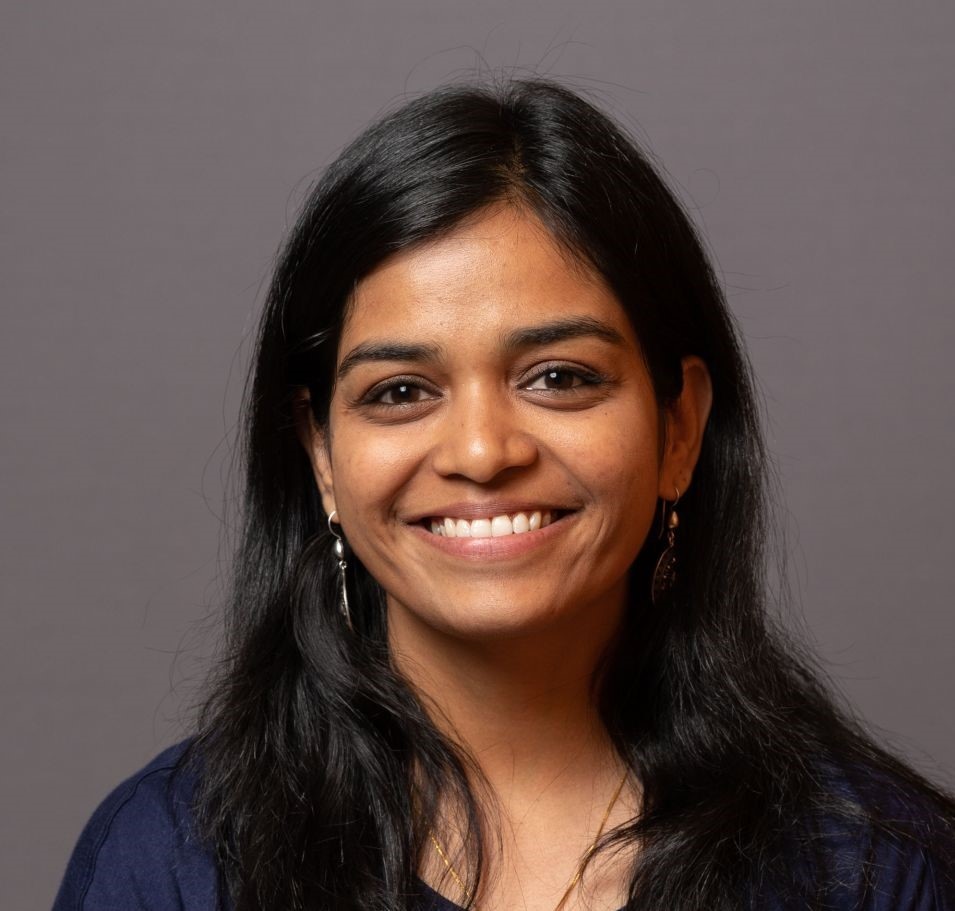 Anusha Avyukt
University of Southern California
Anusha Avyukt
University of Southern California
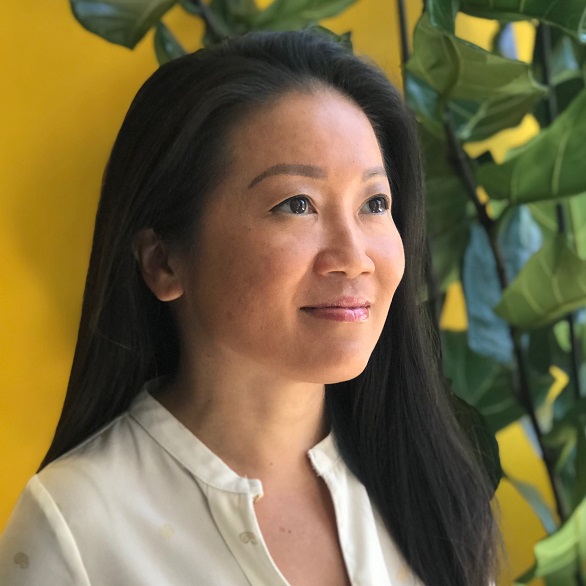 Tram Vo
MOBI: Mobility Open Blockchain Initiative
Tram Vo
MOBI: Mobility Open Blockchain Initiative
 Aljosja Beije
Blocklab
Aljosja Beije
Blocklab
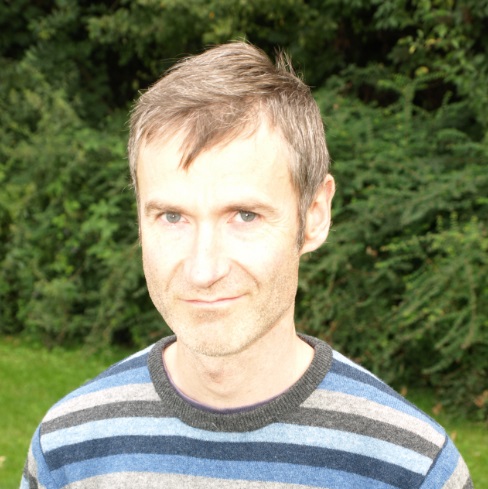 Hugo Embrechts
Sony R&D Center Europe Brussels
Hugo Embrechts
Sony R&D Center Europe Brussels
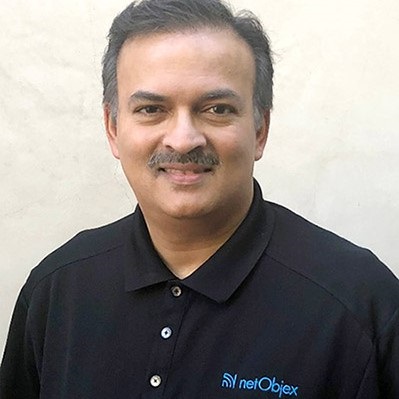 Raghu Bala
NetObjex Inc
Raghu Bala
NetObjex Inc
Thursday, June 23 08:30 (Europe/Helsinki) Keynote
|
|
Polifonia: a digital harmoniser for musical heritage knowledge
Valentina Presutti
University of Bologna
|
Click here for more information
Thursday, June 23 10:00 - 12:45 (Europe/Helsinki)
Industry Track
Click here for more information about the Industry Track
Thursday, June 23 14:00 - 15:00 (Europe/Helsinki)
S6: Emerging Topics in Smart Computing
| 14:00 |
Resource Allocation in Quantum Networks for Distributed Quantum Computing (full paper), Claudio Cicconetti, Marco Conti and Andrea Passarella (IIT-CNR, Italy) |
| 14:20 |
Human Experiences in Teaching Robots: Understanding Agent Expressivity and Learning Effects through a Virtual Robot Arm (full paper), Aviv Elor (University of California - Santa Cruz, USA); Sri Kurniawan (UC Santa Cruz, USA); Leila Takayama (University of California, Santa Cruz, USA) |
| 14:40 |
Wireless Crowd Charging with Battery Aging Mitigation (full paper), Tamoghna Ojha, Theofanis P. Raptis, Marco Conti and Andrea Passarella (IIT-CNR, Italy) |
Thursday, June 23 16:00 (Europe/Helsinki) Panel
Smart Hospital at Home
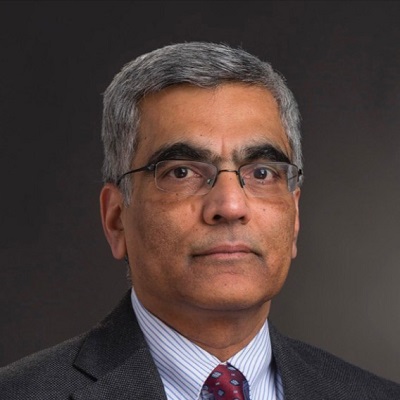 Mohan Kumar
Rochester Institute of Technology
Mohan Kumar
Rochester Institute of Technology
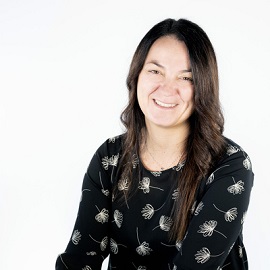 Franca Delmastro
National Research Council of Italy
Franca Delmastro
National Research Council of Italy
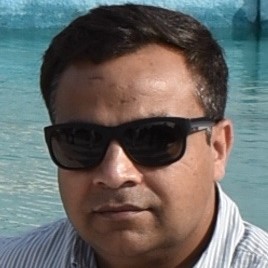 Pushpendra Singh
Indraprastha Institute of Information Technology - Delhi
Pushpendra Singh
Indraprastha Institute of Information Technology - Delhi
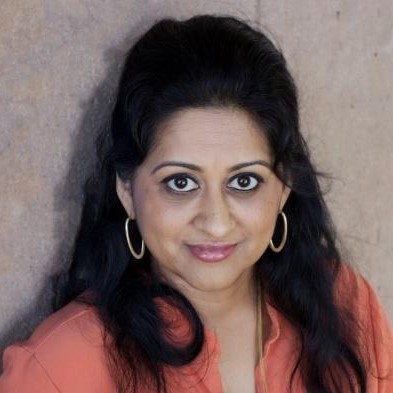 Nalini Venkatasubramanian
University of California at Irvine
Nalini Venkatasubramanian
University of California at Irvine
 Linwei Wang
Rochester Institute of Technology
Linwei Wang
Rochester Institute of Technology
Friday, June 24 10:30 (Europe/Helsinki) Tutorial 1
Transfer learning
 Mori Kurokawa
KDDI Research, Inc.
Mori Kurokawa
KDDI Research, Inc.
 Kota Matsui
Nagoya University Graduate School of Medicine
Kota Matsui
Nagoya University Graduate School of Medicine
 Zhi Li
Osaka University
Zhi Li
Osaka University
 Kei Yonekawa
KDDI Research, Inc.
Kei Yonekawa
KDDI Research, Inc.
Friday, June 24 14:00 (Europe/Helsinki) Tutorial 2
Gesture recognition
 Dariush Salami
Aalto University
Dariush Salami
Aalto University
 Stephan Sigg
Aalto University
Stephan Sigg
Aalto University
PhD Forum
| 15.00-15.10 |
Opening and introduction of the mock thesis committee |
 Prof. Nirmalya Roy
University of Maryland Baltimore County
Prof. Nirmalya Roy
University of Maryland Baltimore County
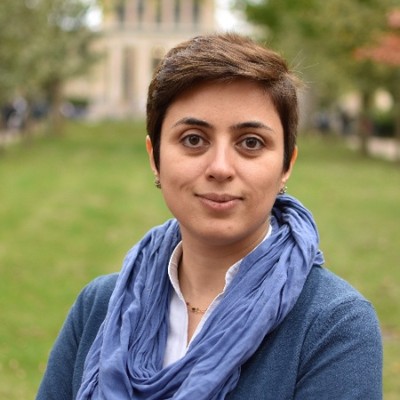 Prof. Hana Khamfroush
University of Kentucky College of Engineering
Prof. Hana Khamfroush
University of Kentucky College of Engineering
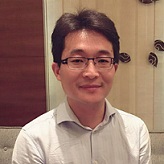 Prof. Weixiong Rao
Tongji University
Prof. Weixiong Rao
Tongji University
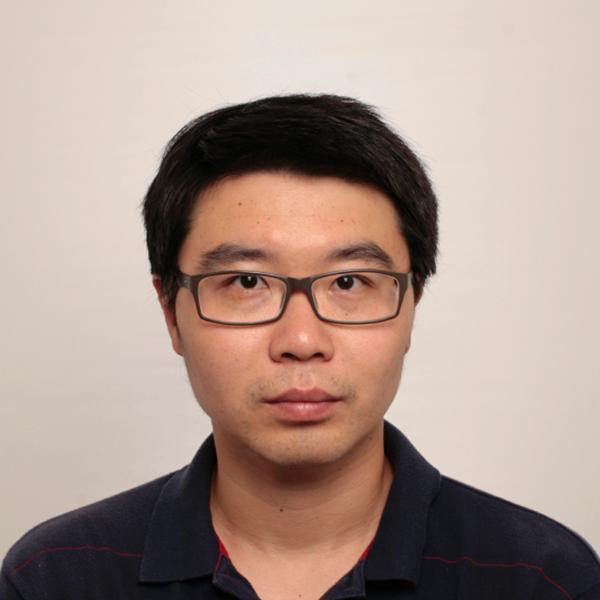 Prof. Xiang Su
Norwegian University of Science and Technology
Prof. Xiang Su
Norwegian University of Science and Technology
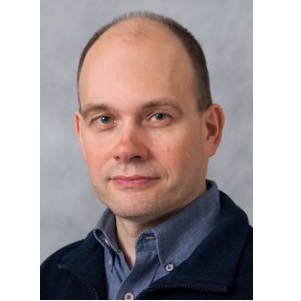 Dr. Vesa Hirvisalo
Aalto University
Dr. Vesa Hirvisalo
Aalto University
| 15.10-15.30 |
Predictable fog computing for cyber-physical systems, Jaakko Juhani Harjuhahto |
| 15.30-15.50 |
Deep learning model composition for edge intelligence, Sumaiya Tabassum Nimi |
| 15.50-16.10 |
Capacity planning for vehicular fog computing, Wencan Mao |
| 16.10-16.30 |
Learn to simulate macro- and micro-scopic human mobility, Jiaming Yin |
| 16.30-16.40 |
Break |
| 16.40-17.00 |
A complexity assessment for the 5G vehicle-to-everything system with information entropy, Jiajian Li |
| 17.00-17.20 |
Account takeover detection on e-commerce platforms, Min Gao |
| 17.20-17.40 |
Scaling up deep reinforcement learning for intelligent video game agents, Anton Debner |
| 17.40-17.50 |
Wrap-up |
Industry Track
The 8th International Conference on Smart Computing (SMARTCOMP 2022) draws upon many industrial applications such as transportation, energy, environmental protection, resource management, healthcare, security, banking, entertainment, and social media. In addition to the research track, this year SMARTCOMP will have a dedicated Industry Track. Accepted papers will be published as part of a separate section of the main conference proceedings that highlights the Industry relevance of the submission. An important criterion for papers to be submitted to the Industry Track is clear industrial association, either in the form of extensive evaluation of research results in industrial use cases or active participation of industry representatives as co-authors. The industry track will provide a forum to discuss novel ideas and emerging results, presenting innovative applications and tools, and bring about novel research questions, approaches, and directions, with an industry focus.
Topics include, but are not limited to, the following:
- Smart Cyber-Physical Environments and Energy / Water / Agriculture / Transportation / Healthcare / Banking Infrastructure / ...
- Security, Privacy, and Economics in Smart Environments
- Smart and Connected Communities across Cities
- Smart Computing Technologies
- Future Smart Computing Paradigms
- Smart Human-centric Environments, Health, Entertainment, and Social Activities
- Artificial Intelligence and Machine Learning for Smart Computing
This work was supported in part by the European Union's Horizon 2020 research and innovation programme under Grant No. 871249.

SMARTCOMP 2022 Industry Track Chairs
Gürkan Solmaz, NEC Labs Europe, Germany
Sameera Palipana, Nokia, Finland
Abhishek Mukherji, Accenture, USA
Technical Program Committee
Suzan Bayhan (University of Twente)
Jonathan Fuerst (NEC Labs Europe)
Joseph Antony (IBM, Ireland)
Sara Modarres Razavi (Ericsson)
Stefania Bartoletti (CNIT, University of Bologna)
Takai Eddine Kennouche (VIAVI)
Avinash Kalyanaraman (Cisco, USA)
David Rojas (Signify, Netherlands)
Pablo Corbalán (NXP semiconductors, Austria)
Ramona Marfievici (Digital Catapult, UK)
Akhil Mathur (Nokia Bell Labs - UK)
Saeidur Rahaman (RMIT, Australia)
Mahbubur Rahman (Samsung Research, USA)
Program
Date: Thursday, June 23
| 10:00-10:05 |
Welcome & short introduction to the industry track program |
| 10:05-10:35 |
High-accuracy joint communication and sensing at mm-wave frequencies |
 Joerg Widmer
IMDEA Networks, Spain
Joerg Widmer
IMDEA Networks, Spain
|
Abstract
The high bandwidth available at millimeter-wave frequencies allows for very high data rates, but at the same time enables highly accurate localization and environment sensing. In this talk, we discuss how to implement low overhead location and sensing systems. As an example, we present results on the location accuracy that can be achieved with simple millimeter-wave commercial off-the-shelf communication devices. We also discuss how to use communication hardware (rather than dedicated radars) to perform zero-cost monitoring of human movement and activities in indoor spaces, by extracting micro-Doppler effects caused by human motion from the access points. We will specifically focus on the practical implementation aspects, testbed design and experimental results with such systems.
About the speaker
Joerg Widmer is Research Professor and Research Director of IMDEA Networks in Madrid, Spain. Before, he held positions at DOCOMO Euro-Labs in Munich, Germany and EPFL, Switzerland. He was a visiting researcher at the International Computer Science Institute in Berkeley, USA, University College London, UK, and TU Darmstadt, Germany. His research focuses on wireless networks, ranging from extremely high frequency millimeter-wave communication and MAC layer design to mobile network architectures. Joerg Widmer authored more than 200 conference and journal papers and three IETF RFCs, and holds 14 patents. He was awarded an ERC consolidator grant, the Friedrich Wilhelm Bessel Research Award of the Alexander von Humboldt Foundation, a Mercator Fellowship of the German Research Foundation, a Spanish Ramon y Cajal grant, as well as nine best paper awards. He is an IEEE Fellow and Distinguished Member of the ACM.
|
| 10:35-11:05 |
Industry view and Samsung role in LOCUS project |
 Tomasz Mach
Samsung R&D Institute, UK
Tomasz Mach
Samsung R&D Institute, UK
|
Abstract
LOCUS is an ongoing EU Horizon 2020 funded collaborative R&D project started in 2019 focused on the localization and analytics in new 5G applications. Core technical work covers use cases, system architecture and proof of concepts based on the novel localization enablers and localization and analytics mechanisms for Smart Network Management and new services e.g. Network-assisted Self-Driving Objects and People Mobility and Flow Monitoring. The project consortium includes partners from the academia and the industry and this talk will illustrate the perspective of one of the industrial partners and will provide an overview of its main research activities. Finally, Samsung technical contributions to different work packages will be presented including their links to standardization.
About the speaker
Tomasz Mach holds PhD degree in mobile communications from the University of Surrey UK with almost twenty years of experience in various technical and leadership roles in the wireless industry. Those include 3G protocol software development, 4G small cells and SON architecture and systems engineering, technical marketing and pre-sales, research and mobile communications standards development including his work in various 3GPP, ETSI, 5GAA and O-RAN Alliance groups. Before joining Samsung in 2015, he worked at Orange, Motorola, Thales, Nokia, Blackberry and Cisco. Recently, he contributed to and coordinated various EU funded international 5G R&D activities including LOCUS project. He is a co-author of "5G System Design: Architectural and Functional Considerations and Long Term Research" book and also authored many patent applications, standards contributions and research papers. Among others, his current interest includes beyond 5G systems and V2X.
|
| 11:05-11:35 |
Past, present and future positioning standardization in 3GPP |
 Sara Modarres Razavi
Ericsson
Sara Modarres Razavi
Ericsson
|
Abstract
In today's fast-paced telecom industry, it is very important to have access to the up-to-date research questions, concerns and problems timely. Standardization fora are the platforms in which these problems would be tackled and while not always the solutions are the best and the most optimum ones, they are basically the result of consensus among many different sectors and players in this field. LOCUS has the muscles in terms of engaged partners to monitor, identify and impact on the problems and solutions brought up in the positioning field of these standardization fora such as 3GPP and ETSI. These engagements are the sources of standard related IPRs as well as platforms initiating global solutions that would be adopted in all devices, networks in future releases in a wide aspect. Ericsson, as one of the LOCUS partners, is actively engaged in 3GPP in all levels of SA, CT and RAN, and is an active contributor in terms of positioning standardization topic since its start from LTE Release 9. The LOCUS project time frame was aligned with Release 17 RAN standardization and the start of Release 18, and the project has been monitoring, reviewing, and contributing to the enhancement of the positioning solutions during its time frame.
About the speaker
Sara Modarres Razavi has recently become the Innovation Program Manager for Ericsson Cloud RAN. Before that she was Master Researcher and the project manager of 5G and 5G-Advanced 3GPP RAN standardization project at Ericsson. She holds a Ph.D. in Infra-Informatics from Linköping University (2014) and MSc. in Hardware for Wireless Communication from Chalmers University of Technology (2008), Sweden. Her research focus has been on 4G, 5G and now 5G-Advanced cellular networks positioning, radio resource optimization and tracking area management. She contributes to several EU funded international 5G R&D projects including LOCUS and ESA funded project called HOP-5G. Sara Modarres Razavi has more than 15 years’ experience in the R&D within the area of wireless communication and networks and her published contributions include 30+ peer reviewed articles and 100+ filed patents mainly in the area of positioning in wireless networks.
|
| 11:45-12:00 |
FLITC: A Novel Federated Learning-Based Method for IoT Traffic Classification, Mahmoud Abbasi (University of Salamanca, Spain); Amir Taherkordi (University of Oslo, Norway); and Amin Shahraki (Fraunhofer IIS, Erlangen, Germany) |
| 12:00-12:15 |
Sales volume prediction, application to materials trading, Marc Souply (RMAN Sync/Normandie Univ, France) , Marc Malmaison (RMAN Sync, France), Francois Rioult , Bertrand Cuissart (Normandie Univ, France) |
| 12:15-12:30 |
Analysis, Hardware Specification and Design of a Programmable Performance Monitoring Unit (PPMU) for RISC-V ECUs, Francesco Cosimi; Fabrizio Tronci (Huawei Research Centre, Italy); Sergio Saponara (Dep. Information Engineering, Italy); Paolo Gai (Huawei Research Centre, Italy) |
| 12:30-12:45 |
Practical Integration of an adaptive Subgrid Identification System in Medium Voltage Smartgrids based on Machine Learning and Virtualization Solutions (short), Frederik Puhe (Westnetz GmbH, Germany) |



 Gurdip Singh
National Science Foundation
Gurdip Singh
National Science Foundation
 Ness Shroff
Ohio State University
Ness Shroff
Ohio State University
 Yiran Chen
Duke University
Yiran Chen
Duke University
 Franco Zambonelli
University of Modena and Reggio Emilia
Franco Zambonelli
University of Modena and Reggio Emilia




 Anusha Avyukt
University of Southern California
Anusha Avyukt
University of Southern California
 Tram Vo
MOBI: Mobility Open Blockchain Initiative
Tram Vo
MOBI: Mobility Open Blockchain Initiative
 Aljosja Beije
Blocklab
Aljosja Beije
Blocklab
 Hugo Embrechts
Sony R&D Center Europe Brussels
Hugo Embrechts
Sony R&D Center Europe Brussels
 Raghu Bala
NetObjex Inc
Raghu Bala
NetObjex Inc

 Mohan Kumar
Rochester Institute of Technology
Mohan Kumar
Rochester Institute of Technology
 Franca Delmastro
National Research Council of Italy
Franca Delmastro
National Research Council of Italy
 Pushpendra Singh
Indraprastha Institute of Information Technology - Delhi
Pushpendra Singh
Indraprastha Institute of Information Technology - Delhi
 Nalini Venkatasubramanian
University of California at Irvine
Nalini Venkatasubramanian
University of California at Irvine
 Linwei Wang
Rochester Institute of Technology
Linwei Wang
Rochester Institute of Technology
 Mori Kurokawa
KDDI Research, Inc.
Mori Kurokawa
KDDI Research, Inc.
 Kota Matsui
Nagoya University Graduate School of Medicine
Kota Matsui
Nagoya University Graduate School of Medicine
 Zhi Li
Osaka University
Zhi Li
Osaka University
 Kei Yonekawa
KDDI Research, Inc.
Kei Yonekawa
KDDI Research, Inc.
 Dariush Salami
Aalto University
Dariush Salami
Aalto University
 Stephan Sigg
Aalto University
Stephan Sigg
Aalto University
 Prof. Nirmalya Roy
University of Maryland Baltimore County
Prof. Nirmalya Roy
University of Maryland Baltimore County
 Prof. Hana Khamfroush
University of Kentucky College of Engineering
Prof. Hana Khamfroush
University of Kentucky College of Engineering
 Prof. Weixiong Rao
Tongji University
Prof. Weixiong Rao
Tongji University
 Prof. Xiang Su
Norwegian University of Science and Technology
Prof. Xiang Su
Norwegian University of Science and Technology
 Dr. Vesa Hirvisalo
Aalto University
Dr. Vesa Hirvisalo
Aalto University

 Joerg Widmer
IMDEA Networks, Spain
Joerg Widmer
IMDEA Networks, Spain
 Tomasz Mach
Samsung R&D Institute, UK
Tomasz Mach
Samsung R&D Institute, UK
 Sara Modarres Razavi
Ericsson
Sara Modarres Razavi
Ericsson